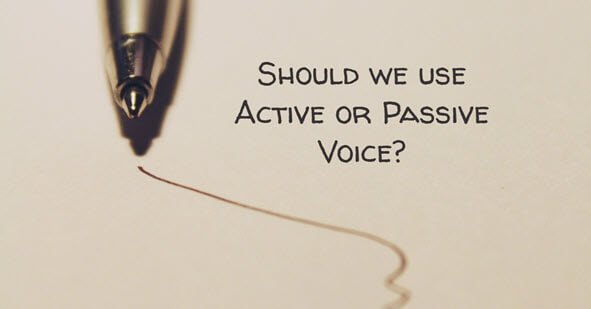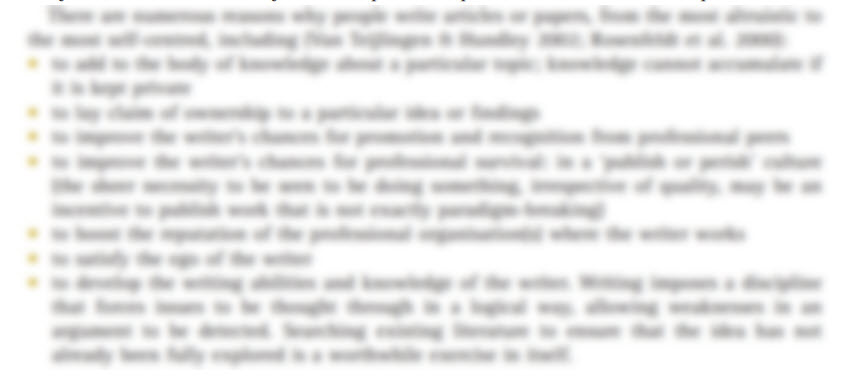The traditional criticism of active voice
Traditionally, science and academic writers were strongly advised to use passive voice in order to maintain objectivity. However, this view is based on the criticism of using the first person (‘I’ or ‘my’) in that an individual’s view or perspective was considered biased. For example, the proponents of the passive voice in science writing claim that the active construction “I observed the behaviour.” presents a subjective view, while the passive construction “The behaviour was observed.” presents a more objective perspective. Some also argue that the use of personal pronouns in science and academic writing gives the impression of stating an opinion. However, active voice is not governed by the use of personal pronouns. You can write in passive voice while using a personal pronoun. For example: “I was photographed by my friend”.
What is meant by ‘voice’?
In simple terms, ‘voice’ refers to the relationship between the subject and the verb.
How to identify active voice
Active voice is when the grammatical subject performs the action specified by the verb.
For example:
Active voice: “I produced ten surveys.” The subject is the person “I” who performs the action “produced”.
How to identify passive voice
Passive voice is when the grammatical subject of the sentence is receiving the action specified by the verb. Passive voice always has the verb form ‘to be’ followed be a past participle. ‘To be’ verbs include: ‘is’, ‘are’, ‘am’, ‘was’, ‘were’, ‘has been’, ‘have been’, ‘will be’, ‘will have been’ and ‘being’. They are also known as linking verbs. A past participle is a past tense verb that often (but not always) ends in ‘ed’.
For example:
Passive voice: “Ten surveys were produced”. The subject is the “surveys” that receives the action “were produced”. In this sentence, the reader does not know who or what produced the surveys.
Passive voice with an object: “Ten surveys were produced by me”. In this example, the object of the sentence specifies who (or what) performs the action (me).
The criticism of passive voice
The insistence that writers should always avoid the personal pronouns (or the first person) has lessened and the use of active voice is increasingly encouraged. Key criticisms of passive voice are that the reader does not know who or what was responsible for the action described in the sentence and that passive sentence constructions are often wordy and vague.
Both types of voice are necessary for good, clear writing
Whether you use active or passive depends upon what you are writing and what you need to focus on.
1. If it is necessary to specify who or what performed the action
Without adding an object identifying the performer of the action, passive construction can make it difficult to know who did what.
For example:
“The effectiveness of stem cell treatment was investigated.” With this statement the reader might be unsure who did the investigation. They might assume that the authors are referring to another study. Whereas, “We investigated the effectiveness of stem cell treatment.” clearly lets the reader know that the authors did the investigation.
If a sentence is to remain passive, a citation might be necessary to let the reader know who did the investigation.
2. If it is necessary to focus on the action itself
The following example is from the methods section of a recent research paper, which uses both passive and active voice. Here the focus is on what was measured, determined, distinguished and compared. Continual reference to who did the measuring is not necessary.
“The abundance, sex ratio, and age structure of GT and NGT trees were determined by designating 47 plots (50 m × 50 m) in the six sites in the main GIAHS area (Fig. 1a). Morphological difference of GT and NGT trees was distinguished by identifying the graft scar just above ground. In each plot, we measured the location, basal diameter (BD), and sex of each of each torreya tree. The sex ratio of NGT trees was calculated in each plot. The population density (number per ha) of GT and NGT trees was statistically compared with a t-test in R.” p 8. Zang et al. 2019
3. If the person or thing responsible for the action is unknown
For example:
Passive: “The car was stolen.”
Active: “Somebody stole my car.”
4. When explaining cause and effect
For example:
Passive: "Most malaria cases are caused by the parasite Plasmodium falciparum".
Active: "The parasite Plasmodium falciparum causes most cases of malaria".
5. If it is necessary to deliberately avoid specifying authorship
Some government departments, consultancies and corporations produce documents where acknowledgement of individual authors is deliberately avoided. This might occur when documents are designed to represent the organisation in its entirety or when a variety of different authors design, write and update documents.
For example:
- Passive: “The remediation program was initiated in early 2015”.
- Active: “Land & Water initiated the remediation program in early 2015”.
In these cases, the third person (we) may be used to collectively represent the organisation or institution.
6. If changing voice will make your writing more concise
If you do not need to specify who did what, your writing can be more concise.
For example:
- “We found that an increase in production rate was caused by increasing the length of the probe.” (16 words)
- “An increase in production rate was caused by increasing the length of the probe.” (14 words).
Changing to active voice makes the sentence shorter and more direct.
- “Increasing the length of the probe caused an increase in production rate.” (12 words).
Finally...
As passive voice is commonly in past tense, some confuse past tense with passive voice. Tense explains when something happened while voice explains who or what performs the action. Here are examples of active and passive voice written in the three different tenses.
For example:
Passive voice
Past tense: "The problem was investigated by me".
Present tense: "The problem is being investigated by me".
Future tense: "The problem will be investigated by me".
Active voice
Past tense: "I investigated the problem".
Present tense: "I am investigating the problem".
Future tense: "I will investigate the problem".
© Dr Marina Hurley 2019 www.writingclearscience.com.au
FURTHER READING
- 11 common mistakes when writing an abstract
- The essentials of science writing: identify your target audience
- Co-authors should define their roles and responsibilities before they start writing
- The difference between a writing rule and a good idea
- When to cite and when not to
- Back to basics: science knowledge is gained while information is produced
- How to build and maintain confidence as a writer
- If science was perfect, it wouldn’t be science
- What is science writing?
- 8 steps to writing your first draft
- Two ways to be an inefficient writer
- Work-procrastination: important stuff that keeps us from writing
Any suggestions or comments please email info@writingclearscience.com.au
Find out more about our new online course...
Now includes feedback on your writing Learn more...
SUBSCRIBE to the Writing Clear Science Newsletter
to keep informed about our latest blogs, webinars and writing courses.





